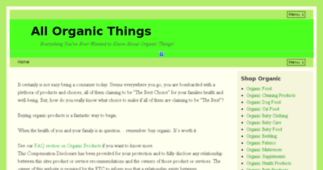All Organic Things
Enter a key term, phrase, name or location to get a selection of only relevant news from all RSS channels.
Enter a domain's or RSS channel's URL to read their news in a convenient way and get a complete analytics on this RSS feed.
Unfortunately All Organic Things has no news yet.
But you may check out related channels listed below.
[...] cutely pointed out as a part of her description, the conventional sweet potato was sprayed with bud nip, additionally called Chlorpropham. Bud nip is only one of the several chemicals extensively [...]
[...] of food manufacturing? Organic is the answer. Animal well being is a leading concern for organic farmers. By law, organic farmers are made to maintain and raise animals without using antibiotics or [...]
[...] pesticides are very expensive and leads them heavily into debt. Natural pesticides used by organic farmers is not only healthier and safer, but it also creates fair economic systems in the supply [...]
[...] Why not “conventional” non-organic cotton? Cotton is supposedly a safe choice because it’s ‘natural’, right? I’d think twice about [...]
[...] products in regards to growing, harvesting, storage space and transportation. However, organic foods must satisfy stricter rules controlling all of these tasks, so the process is typically more [...]
[...] to believe that organically generated foods may be a lot more healthy. Additionally, organic foods and fiber are saved the use of persistent and harmful insecticides, herbicides, [...]
[...] rBGH milk which caused an international ban on US milk? Being informed and looking for only organic products labeled as rBGH-free or No rBGH is the only way to keep yourself safe. Flame Retardant [...]
[...] and contaminates other crops. Elise’s experiment is a warning and a reminder to purchase organic products. [...]
[...] acceptable option to large scale farming and depending on those subsidies. In the end, some organic products may cost more, but, for our environment and the safety of the people and animals occupying [...]
[...] practices when growing their crops, using only fertilizers that are free from chemicals. Organic farming relies on practices of rotating crops as a means to maintain and replenish their soils [...]
[...] us. Our air, plants, soil, water, and even our bodies. In addition to taking in these toxic chemicals through polluted soil and water, when they are sprayed from a crop-duster, these chemicals [...]
[...] to the outdoors and pasture to make sure that they can freely wander. As a matter of fact, organic standards require that cows graze on abundant, nutritious grass for a minimum of one third of their [...]
[...] or for weed control. Organic farm fields must be processed in compliance to all organic standards and remain pesticide free for a minimum of three years to be organic certified. Any [...]
[...] Cotton has many benefits: There are no chemical defoliaints used, and they never use synthetic pesticides or fertilizer. It is tested for contaminants such as heavy metals, formaldehyde, nickel, [...]
[...] ="3"] Buying “organic” assures you that the food will be made without poisonous and toxic pesticides, there will be no use of GMO (genetically modified organisms), growth hormones, or [...]
[...] cutely pointed out as a part of her description, the conventional sweet potato was sprayed with bud nip, additionally called Chlorpropham. Bud nip is only one of the several chemicals extensively [...]
Related channels
-
Get Organized!
All things Organization! Okay, so I was born a little OCD - in some respects it has served me well. Check in with me reg...
-
Everything Organized
Organize your life so you can spend time on the things that matter
-
Organic Food Nutrition
Organic Food Nutrition provides fair information on benefits of organic food and organic farming, explains the differenc...

